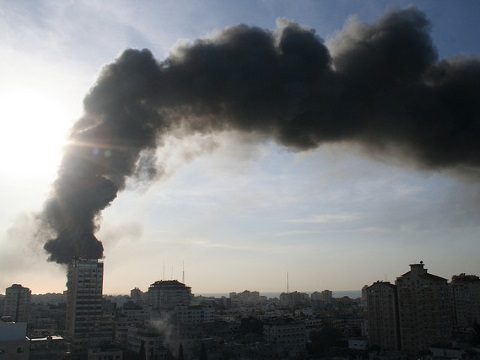 ANTONIA JUHASZ, antoniajuhasz at gmail.com, @antoniajuhasz
ANTONIA JUHASZ, antoniajuhasz at gmail.com, @antoniajuhasz
Juhasz is an oil industry analyst and investigative journalist who has written extensively on oil and the war in Iraq in two books, The Bush Agenda and The Tyranny of Oil, including “Why the Iraq War Was Fought for Big Oil,” on CNN.com.
She said today: “U.S. Military engagement in Erbil is certainly about oil, but it’s also about politics and the Obama administration is not the Bush administration. Western oil companies and the Obama administration will not permit ISIL to control Kurdistan and are willing to engage militarily to achieve this goal. The Kurds have spent the entire period following the 2003 U.S. invasion offering up their oil to western oil companies on the most generous of terms, even implementing the western-oil-company-written Iraq Oil Law when the central Iraqi government refused to, in hopes that doing so would win U.S. support for independence. This week’s military operations may prove the Kurds right — an outcome that may have been sealed the moment the Peshmerga took the Kirkuk oil field (one of the world’s largest) from ISIL and for the first time put it solidly in Kurdish control. Exxon, Chevron, Marathon and Genel — the oil company run by BP’s former CEO Tony Hayward — among many other western oil companies have sizeable interests in Kurdistan. So do many of the talking heads from the Bush administration now filling the airwaves in favor of war, most importantly, Zalmay Khalilzad.
“The 2003 invasion put a great deal of Iraq’s oil into the hands of western oil companies (see my CNN Op Ed, “Why the Iraq War was Fought for Big Oil”), but they have been unable to fully take advantage of Kurdistan’s because of the dispute over who ultimately controls its oil. The Obama administration would not have gone to war only to secure this access. Both western oil companies and the Obama administration have interests in a unified Iraq under more favorable leadership for a broad range of reasons. Today’s U.S. military engagement is about getting rid of Maliki in order to put in place a government better able to maintain ‘stability’ in a manner more fitting U.S. interests throughout the country, including oil interests and including Kurdistan. Both western oil companies and the U.S. government prefer a unified Iraq and are willing to threaten the central Iraqi government with an independent Kurdistan to get the central government in line. If it won’t get in line, then I imagine they’ll decide that an independent Kurdistan will have to do.”
NAFEEZ AHMED, iprdoffice at gmail.com, @nafeezahmed
Ahmed writes the Earth Insight column at The Guardian. He recently wrote the piece “IDF’s Gaza assault is to control Palestinian gas, avert Israeli energy crisis.”
He also recently wrote “Armed robbery in Gaza – Israel, U.S., UK carve up the spoils of Palestine’s stolen gas” for The Ecologist, which states:
“Since the Oslo Accords, although the Palestinian Authority’s maritime jurisdiction extends up to 20 nautical miles from the coast, Israel has incrementally reduced Gaza’s maritime jurisdiction by 85 percent from 20 to 3 nautical miles — effectively reversing Palestinian sovereignty over the Gaza Marine.
“But with Israel’s determination to access Gaza’s gas accelerating in the context of the risk of a 2015 energy crunch, the fundamental obstacle to doing so remained not just the intransigent Hamas, but an insufficiently pliant PA seeking to engage the West’s arch-geopolitical rival, Russia.
“Israel’s own commitment to blocking a two-state solution and bypassing Hamas meant that its only option to bring Gaza’s gas into production was to do so directly — with, it seems, the competing collusion of American and British energy companies.
“The IDF’s Gaza operation, launched fraudulently in the name of self-defence, is certainly though not exclusively about permanently altering the facts on the ground in Gaza to head-off the PA’s ambitions for autonomously developing the Marine gas reserves, and to eliminate Hamas’ declared sovereignty over them.”
Ahmed is executive director of the Institute for Policy Research & Development in London. He has advised the British Foreign Office, Royal Military Academy Sandhurst, and U.S. State Department. He writes for The Ecologist and The Guardian on the geopolitics of interconnected environmental, energy and economic crises. His latest nonfiction book is A User’s Guide to the Crisis of Civilization: And How to Save it, and his forthcoming novel, Zero Point, is out this August.